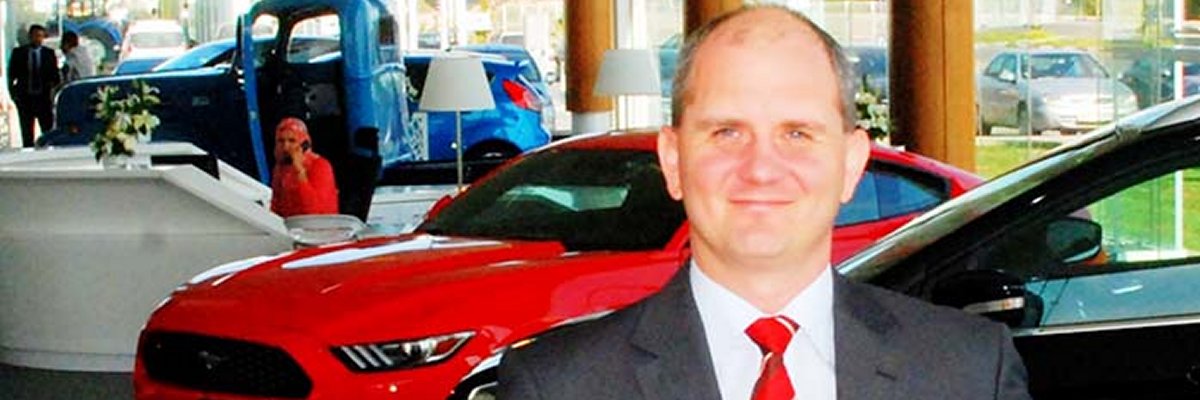News : Morocco
Morocco is one of our most important markets
2017-05-22

Interview:
During his stay in Casablanca, Bernat Szabo, CEO of Ford North Africa, was kind enough to quickly lend himself to a question-answer game. Besides its role as a corporate citizen, it is obviously the industrial future of the American brand that was discussed.
For 2017, what will be the main lines of discussion with the Moroccan Government to further support your growth and expansion in your procurement activities in Tangier?
Bernat Szabo: I would like to say that we fully share the vision and follow with interest the effort of the Moroccan governments to boost the automotive industry in Morocco to develop the local fabric of automotive OEMs. Therefore, we will continue to diversify our suppliers in Morocco and further develop sales of our purchasing operations through the office of Tangier. For this, we bet on a win-win approach based on skills transfer and sharing of knowledge and expertise.
Your procurement operations have helped to create more than 6,000 jobs in the Kingdom, not to mention a turnover of several hundred million dollars to the attention of Moroccan suppliers in 2016. What are the objectives for 2017?
Since May 2015, Ford continues to build on its presence in Morocco by providing components from suppliers based in the country to equip vehicles manufactured in our factories in Europe. Overall, these procurement operations indirectly created more than 6,000 jobs in the Kingdom. In addition, they were able to generate multi-million dollar sales to local suppliers and increase the list of approved suppliers. It is clear that Ford is ambitious for the future to seize the best opportunities that will arise to continue and boost its development.
Do you have concrete examples of your ability to promote industrial culture as well as your willingness to transfer knowledge to local suppliers to improve their business processes?
Since they were set up in May 2015, our Tangier teams play an essential role; they are not only responsible for supplying our factories in Europe but also for coordinating our relations with local subcontractors and their training. Hence the participation of the Tangiers teams in the improvement process of local equipment manufacturers according to Ford standards and production processes via Lean Optimization audits of Ford Europe teams. The suppliers in the region also benefit from continuous local support Ford Supplier Assistance installed in Tangier. We can say that our purchasing operations have allowed the creation of a local ecosystem from the industrial park of Tangier.
You have been sourcing in Morocco for two years now, so can we imagine that the Kingdom will become the regional hub of your future ambitions in North Africa and sub-Saharan Africa in the years to come?
From our offices in Casablanca, we manage our business operations in Morocco, Egypt, Tunisia, Algeria and Libya. Our purchasing office in Tangier has managed to double its teams since the beginning of operations in May 2015. And, as mentioned earlier, the latter are in charge, of the training of our partners. This illustrates Ford's commitment to Morocco and the entire African continent. The Kingdom is indeed one of our most important markets in terms of growth and turnover. It occupies a central part of our strategy and we are proud of what we accomplished here, thanks in particular to the good relations we have with the Government of Morocco and of course the collaboration of our local distributor, SCAMA-Auto Hall.
Morocco is a high-growth market and a growth driver for many manufacturers? What vision and what are your ambitions in the Kingdom? Can we consider any industrial plant from Ford in Morocco in the near future?
The Moroccan automotive sector has experienced remarkable growth in recent years. Ford intends, of course, to accompany this growing power of the sector.
Our commitment to Morocco is a long-term commitment that allows us to be constantly looking for new opportunities to grow our business in Africa and the Middle East, but we have not yet made any announcement about a possible industrial installation of Ford in Morocco.
Ford Motor Company takes very seriously its role as a corporate citizen to local communities that the American manufacturer supports, will you re-run this year the operations carried out last year?
At Ford, social responsibility is reflected in several major initiatives. For example, we launched the Henry Ford Entrepreneurship Academy for young holders of business creation projects. Last year, we also launched from Morocco, a global challenge of creating applications dedicated to the development of urban mobility "Innovate Mobility Challenge". This is an example of programs that help strengthen our position as a car and mobility company.
Do you have other commitments within the company?
We attach an importance to the development of women. So, we launched an innovative program "Ford Warriors in Pink" that highlights the struggle of women with breast cancer. It aims to inspire women facing the disease and contributes, moreover, to disseminate the testimonies of these women to be an example to follow. On the environmental side, Ford puts ecology at the center of its CSR policy. In this sense, our "Ford Motor Company Conservation and Environmental Grants" program supports local projects of Sustainable Development. Our system of ethical values, making our worldwide reputation, is the source of our CSR approach.
Bio Express
It was in 1996 that Bernat Szabo integrates the Ford Motor Company as responsible for the development of customer service. Throughout his long career at Ford, Bernat Szabo has held various positions in sales, customer service and market management. He has assumed the mission of responsible of after-sales service of export operations for Ford in Europe, where he had to manage the problems of after-sales service in 35 countries of different cultures and geographies. He also managed the sales of new vehicles at the headquarters of Ford Europe in Cologne. In 2015, he was appointed CEO of Ford in North Africa.
Original Source: challenge.ma
 Ily Es
Ily Es
Translator
- Your comment
Select Language/Country
© 2016 Naciha.com
